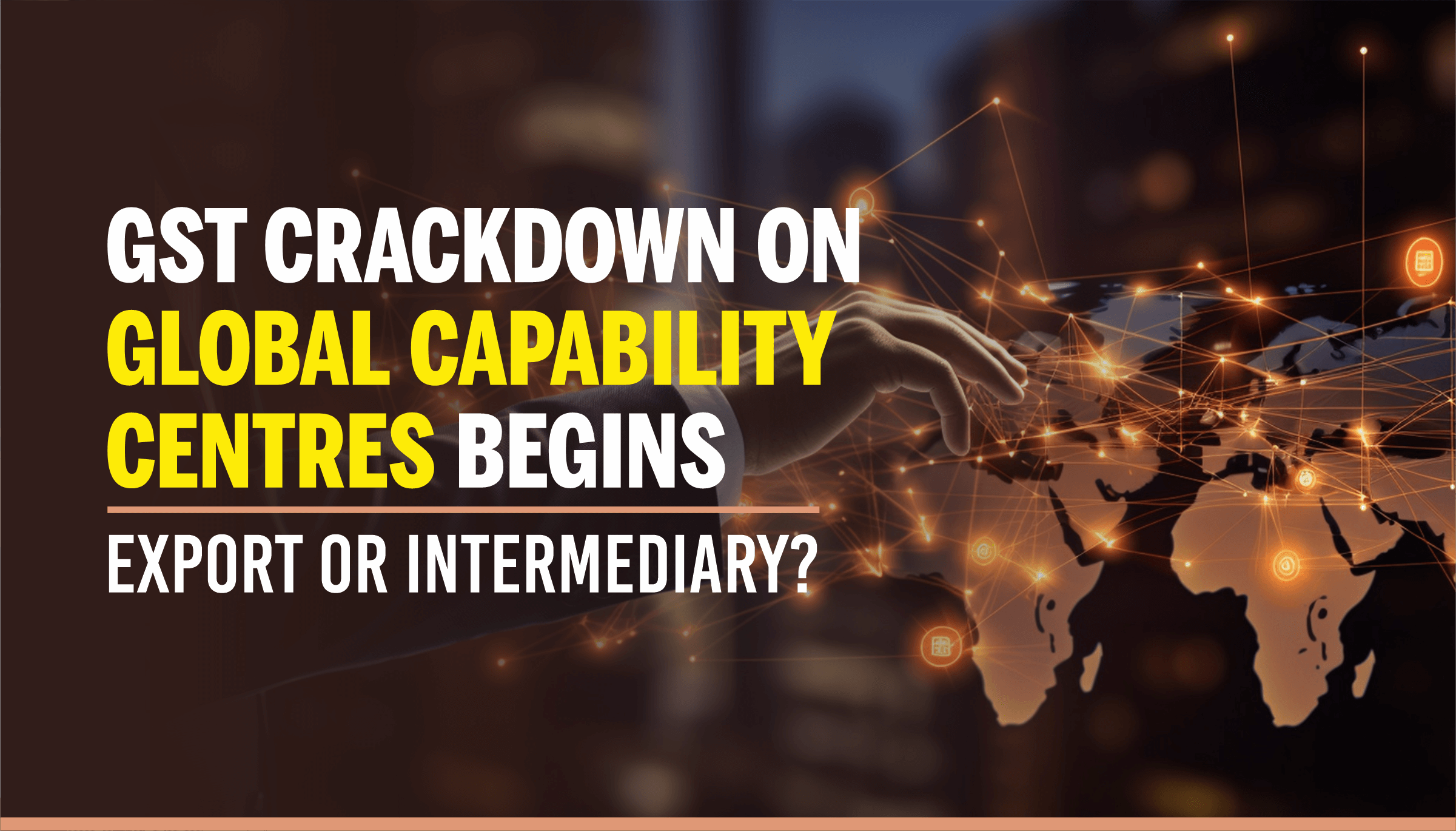GST Crackdown on Global Capability Centres Begins

India’s thriving Global Capability Centre (GCC) ecosystem and multinational subsidiaries are facing a new wave of scrutiny from GST authorities. In recent weeks, tax officers from both state and central jurisdictions, including the Directorate General of GST Intelligence (DGGI), have issued notices and summons to several companies across major business hubs, such as Bengaluru, Pune, Chennai, NCR, Haryana, and Maharashtra.
Authorities are demanding detailed documentation, including client contracts, invoicing models, and functional profiles, to assess whether services provided to overseas clients truly qualify as exports or should be taxed as intermediary services under GST law.
The Core Issue: Export vs. Intermediary
At the heart of the matter is a long-standing ambiguity in India’s GST framework: what defines an “intermediary”?
Under the GST law, services exported from India are considered zero-rated, meaning they attract no GST and are eligible for input tax credit (ITC) refunds. This framework is designed to support India’s export competitiveness, particularly in high-skill service sectors such as IT, consulting, and R&D.
However, services categorized as “intermediary” are treated very differently. An intermediary, as per Section 2(13) of the IGST Act, is a person who arranges or facilitates the supply of goods or services between two or more persons, but does not supply those goods or services on their own account. Importantly, such services are not considered exports under GST and are therefore taxable in India, even if the recipient is located outside the country.
This classification results in GST liabilities, loss of refund eligibility, and increased compliance burdens — all of which directly impact the cost structure and global competitiveness of Indian service providers.
Why It Matters for GCCs and MNCs
The companies currently under scrutiny — many of them GCCs or Indian arms of foreign multinationals — argue that they deliver services on their own account, not as intermediaries. These include critical backend operations like IT development, R&D, digital marketing, analytics, and content creation.
According to these firms, their contracts clearly define them as primary service providers, rather than facilitators or brokers. They contend that treating them as intermediaries is a misinterpretation of the law and a misfit in the context of modern service delivery models.
However, tax authorities are reportedly interpreting client dependencies, internal group invoicing structures, and centralized control in some MNC setups as indicators of an intermediary role, leading to disputes.
The Technical Layer: Where the Law Stands
The intermediary definition under GST has remained a grey area for years. While a clarificatory circular was issued in 2021, it did not fully resolve industry concerns.
Some of the key parameters used by tax officers to classify a service provider as an intermediary include:
-
Whether the provider has independence in delivering the service
-
If the payment structure links to the actual value delivered
-
Whether the provider is merely enabling delivery by a foreign entity
However, these parameters often conflict with the way modern global delivery models operate, particularly in instances where Indian units serve foreign group entities but are responsible for end-to-end service delivery under global contracts.
This mismatch between legal interpretation and business reality is what fuels repeated assessments, litigation, and uncertainty.
The Risk to India’s Services Export Engine
The implications are significant. India’s GCC industry alone employs nearly 2 million professionals and is projected to contribute over $100 billion in revenue by 2030. Service exports are a key component of India’s foreign exchange earnings, and sectors like IT, R&D, finance, and media depend heavily on a clear and stable tax regime.
Any misclassification under GST not only affects cash flow but also raises doubts in the minds of foreign investors and global parent companies about India’s reliability as a service delivery base.
What Lies Ahead?
Amid growing industry concern, the government is reportedly considering amendments to the GST law to bring greater clarity. One possibility is to carve out exceptions within the intermediary definition for certain categories of cross-border services, primarily where the provider operates on a principal-to-principal basis.
Until then, industry experts call for urgent administrative clarity — possibly in the form of fresh circulars or FAQs — to prevent the issue from escalating into widespread litigation.
Final Word
The ongoing GST crackdown on GCCs and MNCs emphasizes the need for tax laws to evolve in tandem with business models. What may have once applied to brokers and agents cannot be blindly extended to advanced delivery centres driving India’s services export engine. With global competition heating up, ensuring tax certainty and clarity is not just a compliance issue – it’s a national economic imperative.
